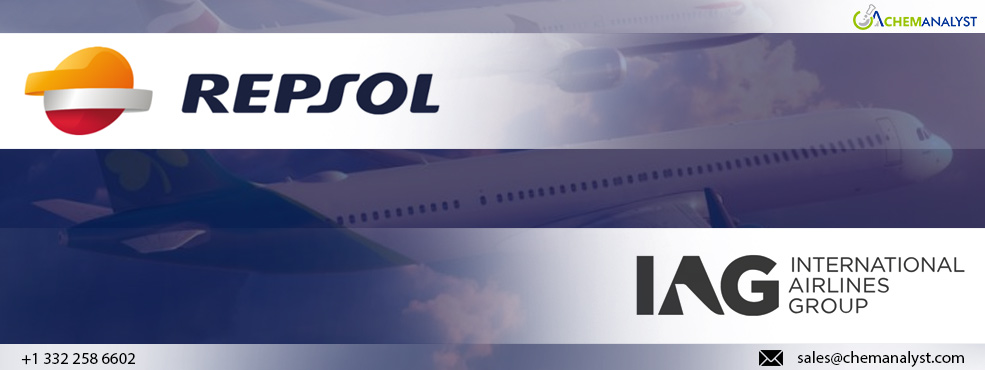Welcome To ChemAnalyst

International Airlines Group (IAG) has finalized an agreement with the multi-energy company Repsol to purchase and supply over 28,000 tonnes of sustainable aviation fuel (SAF) over the next six months. This SAF, supplied by Repsol, will be used by IAG’s airlines based at Spanish airports, such as Aer Lingus, British Airways, Iberia, Iberia Express, and Vueling.
This agreement marks the largest voluntary SAF purchase ever made in Spain. With this supply, IAG progresses towards its commitment to decarbonize its operations, moving closer to meeting the ReFuel EU regulation's goal of using 2% SAF by 2025. SAF offers a reduction of over 80% in net CO2 life cycle emissions compared to traditional jet fuel, from production through to consumption. As with all its SAF acquisitions, IAG ensures that the SAF meets stringent sustainability certification standards.
This year, Repsol has commenced the production of 100% renewable fuels at its Cartagena facilities. The plant, the first major facility in Spain and Portugal dedicated solely to producing 100% renewable fuels, represents a €250 million investment by Repsol. It has a production capacity of 250,000 tonnes per year and can manufacture both renewable diesel and SAF from waste.
Luis Gallego, CEO of IAG, stated: “Sustainability is a top priority for IAG and a cornerstone of our strategy and transformation. We are working diligently to secure our future SAF requirements and meet our commitments, which exceed EU legislative expectations. However, it is crucial that governments continue to support the growth of the SAF industry to boost its availability and lower costs. Developing a European SAF industry has the potential to generate thousands of jobs and significantly boost GDP.”
Josu Jon Imaz, CEO of Repsol, remarked: “This agreement with IAG, one of the world’s largest airline groups, reinforces our commitment to 100% renewable fuels as a crucial driver for the decarbonization of transport in Spain. The aviation industry requires solutions like sustainable aviation fuels, and at Repsol, we are ready to meet this demand through our 100% renewable fuels plant in Cartagena.”
IAG was the first airline group globally to pledge net zero emissions by 2050 and the first European group to set a target of using at least 10% SAF to meet its fuel needs by 2030.
These commitments have translated into tangible actions. As of December 31, 2023, IAG had invested $1 billion in SAF, with 86% allocated to future commitments. By the end of February, IAG had already secured one-third of the SAF required to achieve its 10% SAF goal by 2030.
In 2023, the group's airlines utilized over 53,000 tonnes of SAF, marking a 417% increase from 2022 and representing one of the highest volumes globally. This SAF use led to a reduction of more than 157,000 tonnes of CO2 emissions. Additionally, operational efficiency measures helped avoid another 86,000 tonnes of CO2 emissions.
IAG's airlines in Spain and Repsol have been working together on the decarbonization of air transport for several years.
In 2021, Iberia conducted Spain's first flight using biofuel produced from waste on the Madrid-Bilbao route, utilizing sustainable fuel from the Petronor refinery. The following year, in collaboration with Repsol, Iberia operated its first long-haul flights with this biofuel, covering routes from Madrid to Washington, San Francisco, and Dallas. Both companies are part of All4Zero, an industrial technology innovation hub focused on developing decarbonization and circular economy technologies.
Additionally, in 2021, Vueling completed its first flight using sustainable fuel on the Barcelona-Seville route, with SAF produced from biomass at Repsol’s Tarragona Industrial facilities. In February, during the Malaga Film Festival, Vueling operated a flight from Barcelona to Malaga with 50% of the fuel being SAF supplied by Repsol.
Repsol is a pioneer in Spain for producing renewable fuels for all modes of transport, including aviation. The company has proactively advanced beyond EU regulations aimed at promoting SAF use. Repsol aims to reach a production capacity of up to 1.7 million tonnes of renewable fuels by 2027 and up to 2.7 million tonnes by 2030, positioning itself as a leader in the Iberian Peninsula's renewable fuels market.
We use cookies to deliver the best possible experience on our website. To learn more, visit our Privacy Policy. By continuing to use this site or by closing this box, you consent to our use of cookies. More info.
